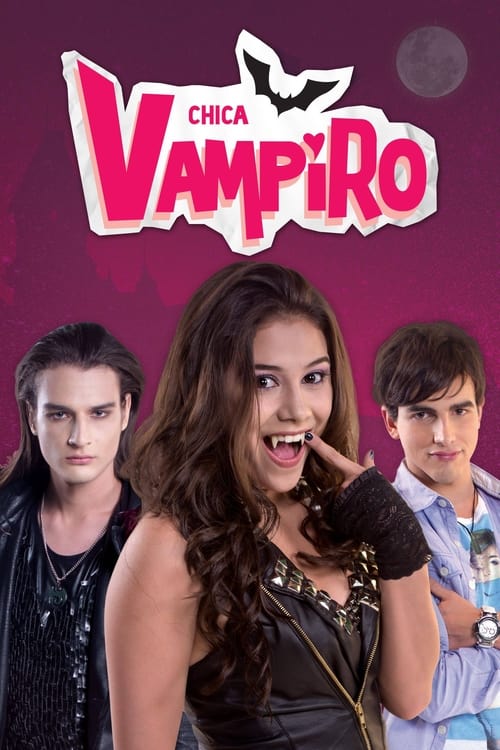
Ask Your Own Question
What is the plot?
In the opening scene of "Vampire Girl," we are introduced to the protagonist, a high school student named Yuki, who struggles with the typical challenges of adolescence while harboring a dark secret: she is a vampire. The story begins with Yuki attending a school where she feels isolated due to her condition. She has a close-knit group of friends, but she often feels the need to hide her true nature from them. The audience sees her internal conflict as she grapples with her thirst for blood and her desire to fit in.
As the first episode progresses, Yuki's life takes a turn when a new student, Haru, transfers to her school. Haru is charming and quickly becomes popular among the students. Yuki is drawn to him, feeling a connection that she has never experienced before. However, she is also wary of her feelings, fearing that her vampire instincts might put him in danger. This tension sets the stage for Yuki's emotional journey throughout the season.
In a pivotal moment, Yuki's best friend, Aiko, discovers her secret when she accidentally witnesses Yuki feeding on a small animal in the woods. Aiko is horrified and confronts Yuki, leading to a heated argument where Yuki pleads for understanding. Aiko ultimately decides to keep Yuki's secret, but their friendship is strained, and Yuki feels increasingly isolated. This moment marks a significant turning point in Yuki's character development, as she realizes the weight of her secret and the potential consequences of her actions.
As the episodes unfold, Yuki's relationship with Haru deepens. They share moments of vulnerability, and Yuki begins to let her guard down. However, her vampire instincts are always lurking beneath the surface. In one episode, during a school trip, Yuki is pushed to the brink when she is confronted by a rival vampire, Kaito, who threatens to expose her. In a tense confrontation, Yuki must choose between protecting her secret and defending her friends. She ultimately decides to confront Kaito, leading to a dramatic showdown where she uses her supernatural abilities to fend him off, showcasing her strength and determination.
The stakes rise when Kaito reveals that he knows about Yuki's family history, hinting at a dark legacy that she is unaware of. This revelation sends Yuki on a quest to uncover her family's past, leading her to discover that her ancestors were part of a vampire clan that was hunted down by humans. This backstory adds layers to Yuki's character, as she grapples with the implications of her lineage and what it means for her future.
In a climactic episode, Yuki's secret is finally exposed when a school event goes awry. During a blood drive organized by the school, Yuki's thirst becomes uncontrollable, and she accidentally reveals her true nature in front of her classmates. The chaos that ensues leads to a confrontation with Haru, who feels betrayed and hurt. Yuki is devastated by the fallout, and her emotional turmoil is palpable as she realizes that she has lost the trust of those she cares about.
In the final episodes of the season, Yuki must navigate the consequences of her actions. She is ostracized by her peers, and her relationship with Haru hangs in the balance. Meanwhile, Kaito continues to pursue her, seeking to manipulate her for his own gain. Yuki's internal struggle intensifies as she battles her instincts and the fear of becoming the monster she has always tried to avoid.
The season culminates in a dramatic confrontation between Yuki, Kaito, and Haru. In a tense showdown, Yuki must choose between embracing her vampire nature and protecting her friends. The fight is intense, with Yuki using her powers to defend herself and those she loves. Ultimately, she makes a sacrifice, allowing Kaito to escape in order to save Haru, solidifying her growth as a character who prioritizes her loved ones over her own desires.
The season ends on a cliffhanger, with Yuki reflecting on her choices and the path ahead. She stands at a crossroads, contemplating her identity as a vampire and the relationships she has jeopardized. The final scene leaves viewers questioning what lies ahead for Yuki as she prepares to face the challenges of her dual existence in the next season.
What is the ending?
In the ending of "Vampire Girl," the main character, a young girl named Yuki, confronts her vampire heritage and the consequences of her choices. After a climactic battle with her vampire mother, Yuki embraces her identity and decides to protect her friends and the human world from the dangers of her lineage. The season concludes with Yuki standing at a crossroads, determined to forge her own path while accepting the darkness within her.
As the final episode unfolds, the tension escalates in a dimly lit forest, where Yuki stands face-to-face with her mother, the powerful vampire matriarch, who has been manipulating events from the shadows. The air is thick with anticipation as Yuki, fueled by a mix of fear and defiance, prepares for the confrontation that has been building throughout the season. Her heart races, not just from the impending battle, but from the emotional weight of finally facing the truth about her lineage.
Scene breaks reveal the stark contrast between Yuki's human friends, who are anxiously waiting for her return, and the dark, foreboding atmosphere of the forest. As Yuki and her mother exchange heated words, the audience can feel the deep-seated conflict between familial loyalty and the desire for independence. Yuki's mother, with her piercing gaze and commanding presence, tries to sway Yuki back to the vampire world, promising power and immortality. However, Yuki's resolve strengthens as she recalls the friendships and love she has cultivated among humans.
The battle erupts with a flurry of supernatural energy, showcasing Yuki's newfound abilities as she fights against her mother's overwhelming strength. Each clash is not just physical but also emotional, representing Yuki's struggle to accept her dual identity. The forest becomes a battleground of light and shadow, mirroring Yuki's internal conflict. As the fight intensifies, Yuki taps into her human emotions, drawing strength from her memories of laughter and love shared with her friends.
In a pivotal moment, Yuki manages to outsmart her mother, using her wits and agility to gain the upper hand. With a final surge of determination, she confronts her mother, declaring that she will not be a pawn in her game. This declaration is a turning point, symbolizing Yuki's acceptance of her identity while rejecting the toxic legacy of her mother.
As the dust settles, Yuki stands victorious but emotionally drained. Her mother, defeated, vanishes into the shadows, leaving Yuki with a bittersweet sense of closure. The forest, once a place of fear, transforms into a symbol of Yuki's newfound strength and autonomy.
The final scenes shift back to Yuki's friends, who have been anxiously waiting for her return. When Yuki emerges from the forest, her expression is a mix of relief and determination. She embraces her friends, who have stood by her side throughout her journey. In this moment, the bonds of friendship are reaffirmed, highlighting the importance of human connections in the face of darkness.
The season concludes with Yuki standing at a crossroads, looking out into the horizon. She is aware of the challenges that lie ahead, but she is ready to face them on her own terms. The camera pans out, leaving viewers with a sense of hope and the promise of new adventures, as Yuki embraces her dual identity as both a vampire and a protector of the human world. Each character's fate is intertwined with Yuki's choice; her friends remain by her side, while her mother's fate is left ambiguous, hinting at potential future conflicts.
Is there a post-credit scene?
In "Vampire Girl," season 1, there is indeed a post-credit scene that adds an intriguing layer to the narrative. After the final episode concludes, the screen fades to black, and a soft, eerie music begins to play, setting a suspenseful tone.
The scene opens in a dimly lit forest, where the moonlight filters through the trees, casting long shadows on the ground. A figure cloaked in darkness stands at the edge of a clearing, their face obscured. As the camera zooms in, the figure slowly pulls back their hood, revealing a strikingly beautiful woman with piercing red eyes--an ancient vampire who has been hinted at throughout the season but never fully revealed.
She gazes into the distance, a smirk playing on her lips, as she speaks softly to herself, "They think they can escape their fate." Her voice is smooth yet laced with a chilling undertone, suggesting a deep-seated knowledge of the events that have transpired in the series.
Suddenly, the scene shifts to a close-up of a blood-red rose lying on the forest floor, dew glistening on its petals. The camera lingers on the rose, symbolizing both beauty and danger, before cutting back to the vampire woman, who begins to walk deeper into the woods. As she disappears into the shadows, the screen fades to black once more, leaving viewers with a sense of foreboding and anticipation for what is to come in future seasons.
This post-credit scene effectively sets the stage for new conflicts and introduces a powerful new character, hinting at the complexities of the vampire world that will unfold in subsequent episodes.
What is the significance of the blood moon in Vampire Girl?
The blood moon serves as a pivotal plot device in 'Vampire Girl.' It is believed to enhance the powers of vampires and is tied to a prophecy that foretells the rise of a powerful vampire queen. The characters are deeply affected by the impending blood moon, as it heightens tensions between the vampire clans and the human hunters.
How does the relationship between Mia and Alex evolve throughout the season?
Mia and Alex's relationship begins with tension and mistrust, as Mia is a vampire and Alex is a human hunter. Initially, they are adversaries, but as they face common threats, their bond deepens. Mia struggles with her vampire instincts and her growing feelings for Alex, leading to moments of vulnerability and conflict as she tries to reconcile her nature with her emotions.
What role does the character of Victor play in Mia's journey?
Victor is Mia's mentor and a seasoned vampire who embodies the traditional values of their kind. He represents the old ways and often clashes with Mia's more modern views. His guidance is crucial as Mia navigates her identity and the challenges of being a vampire in a world that fears her kind. Victor's own struggles with power and morality influence Mia's decisions and growth.
What are the consequences of Mia revealing her vampire identity to her human friends?
When Mia reveals her vampire identity to her human friends, it leads to a cascade of emotional turmoil and betrayal. Some friends react with fear and anger, while others struggle to accept her. This revelation strains Mia's relationships and forces her to confront the reality of her dual existence, ultimately leading to a pivotal moment where she must choose between her vampire heritage and her human connections.
How does the rivalry between the vampire clans impact the main characters?
The rivalry between the vampire clans creates a backdrop of danger and intrigue that directly impacts the main characters. As tensions escalate, Mia finds herself caught in the middle, forced to navigate alliances and betrayals. This conflict not only heightens the stakes for her personal journey but also tests her loyalties, pushing her to make difficult choices that affect her relationships with both vampires and humans.
Is this family friendly?
"Vampire Girl," season 1, produced in 2013, contains several elements that may not be considered family-friendly. Here are some potentially objectionable or upsetting aspects:
-
Violence and Blood: The show features scenes of violence, including confrontations between vampires and humans, which often result in bloodshed. The depiction of blood can be graphic and may be unsettling for younger viewers.
-
Supernatural Themes: The presence of vampires and other supernatural creatures may be frightening for children or sensitive individuals, as it delves into themes of horror and the unknown.
-
Dark Emotional Themes: Characters often grapple with intense emotions such as betrayal, loss, and existential dread, which may be too heavy for younger audiences to process.
-
Romantic Relationships: The show explores complex romantic relationships, including those that may involve manipulation or unhealthy dynamics, which could be confusing or inappropriate for children.
-
Mature Language: There are instances of strong language and adult conversations that may not be suitable for younger viewers.
-
Moral Ambiguity: Characters often face moral dilemmas that challenge traditional notions of good and evil, which might be difficult for children to understand.
These elements contribute to a darker tone that may not be appropriate for all audiences, particularly children or those sensitive to such themes.

























